
Transportation in Vietnam is improving rapidly in terms of both quantity and quality. Road traffic is growing rapidly but the major roads are dangerous and slow to travel on due to outdated design and an inappropriate traffic mix. In recent years, the construction of expressways has accelerated. Air travel is also important for long distance travel. Metro systems are under construction in the two metropolises of Hanoi and Ho Chi Minh City.
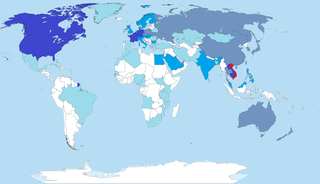
Overseas Vietnamese refers to Vietnamese people who live outside Vietnam. There are approximately 5 million overseas Vietnamese, the largest community of whom live in the United States.
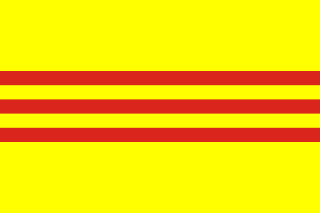
The State of Vietnam was a governmental entity in Southeast Asia that existed from 1949 until 1955, first as a member of the French Union and later as a country. The state claimed authority over all of Vietnam during the First Indochina War, although large parts of its territory were controlled by the Democratic Republic of Vietnam.
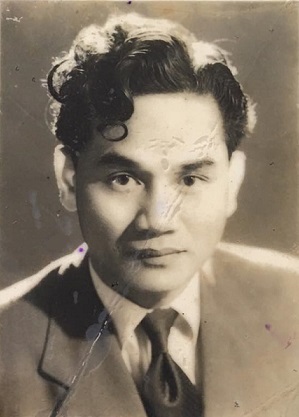
Ngô Xuân Diệu was a Vietnamese poet, journalist, short-story writer, and literary critic, best known as one of the prominent figures of the twentieth-century Thơ mới Movement. Heralded by critics as "the newest of the New Poets", Xuân Diệu rose to popularity with the collection Thơ thơ (1938), which demonstrates a distinct voice influenced by Western literature, notably French symbolism. Between 1936 and 1944, his poetry was characterized by a desperation for love, juxtaposed with a desire to live and to experience the beauty of the world. After joining the Vietnamese Communist Party in 1945, the themes of his works shifted towards the Party and their resistance against the French and the Americans. When he died in 1985, he left behind about 450 poems, as well as several short stories, essays, and literary criticisms.
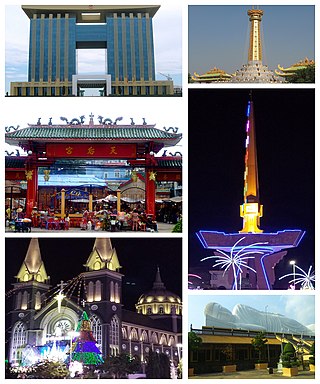
Thủ Dầu Một is the capital city of Bình Dương province, Vietnam, located at around 10°58′0″N106°39′0″E. The city has an area of 118.66 km², with a population of 321,607, and is located 20 km north of downtown Ho Chi Minh City, on the left bank of the Saigon River, upstream from the city.

Nguyễn Xuân Oánh, nicknamed Jack Owens, was a Vietnamese economist and politician who held senior positions in the governments of both South Vietnam and the current Socialist Republic of Vietnam.
Vietnamese people in Russia form the 72nd-largest ethnic minority community in Russia according to the 2022 census. With a population of 150,000, they are one of the smaller groups of overseas Vietnamese. Unofficial estimates put their population as high as 100,000 to 150,000. However, the real number of Vietnamese in Russia is often hard to analyze, due to large number of illegal Vietnamese immigrants living underground across Russia and due to the nature of the Vietnamese–Russian relations.
Koreans in Vietnam form an unrecognized minority group in Vietnam.
Miss Vietnam World is a beauty contest for both Vietnamese women in Vietnam and Overseas Vietnamese women from other countries in the world. The pageant is related to Miss World Vietnam but not to the Miss Vietnam pageants. The contest was first held in 2007, and the next was held in August 2010.
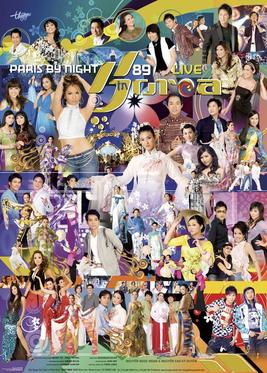
Paris By Night 89: In Korea is a Paris By Night program that was filmed at the Olympic Fencing Gymnasium at the Olympic Park in Seoul, South Korea on Sunday, July 1, 2007. It is Thúy Nga's first venture into Asia to tape a Paris By Night program. Thúy Nga chose to tape at South Korea, rather than any other country in Asia simply because of the popularity of Korean actors and singers to the Vietnamese community. The program is directed by a Korean director, Seounghyun Oh. It is Thúy Nga's fourth "Live" show.

Paris By Night 90: Chân Dung Người Phụ Nữ Việt Nam is a Paris By Night program produced by Thúy Nga that was filmed at the Terrace Theater at the Long Beach Convention and Entertainment Center on September 15, 2007 and September 16, 2007.

Paris By Night 91: Huế, Sài Gòn, Hà Nội is a Paris By Night program produced by Thúy Nga that was filmed at the Terrace Theater at the Long Beach Convention and Entertainment Center on January 12, 2008 and January 13, 2008.
Nigerians in Vietnam are mostly expatriates from Nigeria residing in Vietnam for business or economic purposes. They are part of a new wave of Nigerian emigrants going to non-traditional migration destinations such as Ethiopia, Ghana, and Mozambique rather than traditional favorites like Libya, the United Kingdom, or the United States. They refer to poor economic conditions in their homeland, including lack of electricity and public safety, as their primary motivations for emigration.

South Korea and Vietnam established formal diplomatic relations on 22 December 1992, though the two countries had already had various historical contacts long before that. According to Vietnamese Prime Minister Phan Văn Khải, "The Republic of Korea is a very important partner of Vietnam and a good model for Vietnam to expand cooperation and exchange experiences during its development process." On 2022, South Korea and Vietnam upgraded their relationship in to "comprehensive strategic partnership", became the fourth country after China, Russia and India to do so.

Esther Lưu born June 22, 1985, professionally known as Hari Won, is a South Korean-born Vietnamese singer, actress and MC in Vietnam.

Phạm Minh Chính is a Vietnamese politician and public security general. He is the current Prime Minister of Vietnam, the third highest ranking after General Secretary of the Communist Party and the President of Vietnam.

Võ Văn Thưởng is a Vietnamese politician serving as the President of Vietnam since 2023, being the youngest person to serve in this position since the country's reunification. As the country's head of state, Thưởng is the second highest official in Vietnam after Nguyễn Phú Trọng, the general secretary of the Communist Party of Vietnam.
Dương Tử Giang (1915–1956), born as Nguyễn Tấn Sĩ, was a Vietnamese writer, journalist, playwright and revolutionary.












